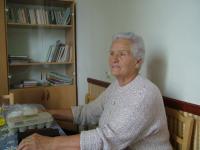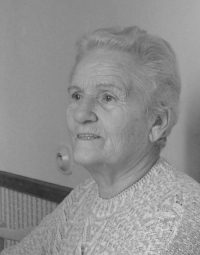„I would be happier, if people were less selfish, envious, and would care about the poor.“

Stáhnout obrázek
Jarmila Pösslova was born on the 10th of February in 1920 in Nemochovice near Vyškov. She was trained as a salesgirl. During the Second World War, she participated in the Czech resistance movement around Nemochovice where a Partisan group called Jan Žižka z Trocnova - unit Olga - had operated. Her family helped the partisans obtain clothes, bandages, food, or information, and to find secure hiding places. They were sheltering the partisans as well. After the war in 1948 she got married to a forester. They had lived near Bruntál in a former hunter‘s manor.

